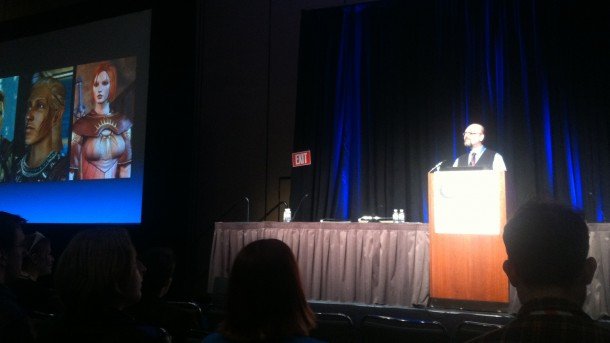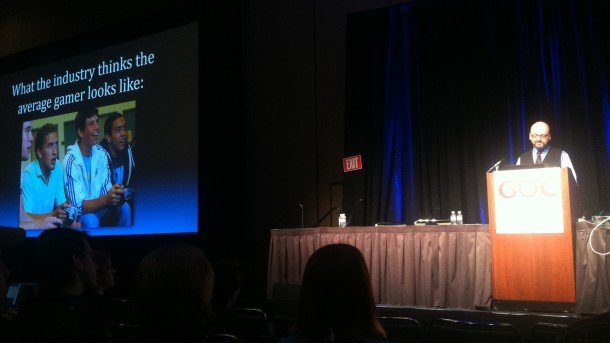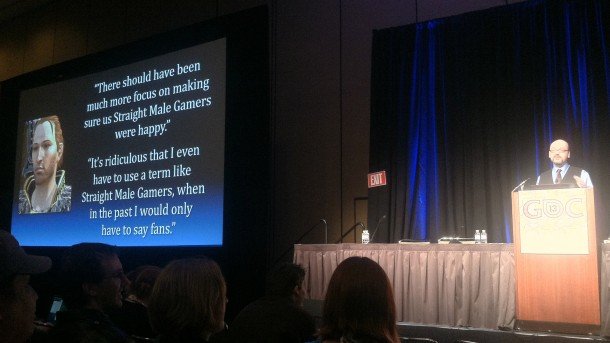GDC 2013: BioWare's David Gaider asks, "How about we just decide how not to repel women?"

Dragon Age Senior Writer David Gaider gave a talk at GDC yesterday titled "Sex in Video Games." It wasn't about "boobies and penises," as Gaider jokingly put it, but about how sex and gender are portrayed in games, and why the industry should take responsibility for the messages it sends. His conclusion is that the industry, at the very least, needs to stop actively repelling women and minorities, and is responsible for setting a tone which condones sexism.
Gaider began by criticizing some of the early decisions he made while working on romance options—he started with Baldur's Gate II, so he's had a lot of experience. "We censored ourselves," said Gaider, chastising the studio for initial trepidation over the idea of including same-sex relationships. Since then, he says BioWare has learned how its choices impact players.
"The moment [BioWare] broached the subject of romance and sex, we were saying something about what was acceptable, and what was normal, and who we thought our audience was," said Gaider. "We said that whether we wanted to say anything or not. We said it by virtue of what we included, as well as what we didn't include. Those were statements."
Gaider went on to say that portraying sex in games is difficult because the public views gamers as "mostly children," while the industry views them as teenage boys who want sexualized female characters. He counters these perceptions with stats about BioWare's playerbase and the ESA's demographics survey, which indicate a large female audience.
"Are we still marketing our games primarily to that 18 to 25 [male] demographic?" he asked. "Are we all fighting for the same piece of that same slice of that pie? As nice as it must be to be that demographic—when you've got everyone banging on your door, trying to court you, it must be very pleasant—what's it like for someone who isn't in that demographic? We know they play our games. We can see that they do. OK, there's support for that, but it's not because anyone invited them to play. In fact, in a lot of cases, it's clear they play despite it being made plainly obvious to them that they're not the intended audience."

The problem, says Gaider, comes from falsely held industry standards and the phenomenon of privilege. Regarding the former, Gaider made no concessions for "conventional industry wisdom." It's "bull****," he said, after ridiculing the idea that games with female protagonists aren't marketable.
"Are we supposed to accept the opposite, that a game which has a male protagonist and sells well, sells well because it has a male protagonist?" asked Gaider. "What about the ones with male protagonists that don't sell well? Are those for other reasons? What would be the bar at which the industry would change its mind about female protagonists? Would we need a title to sell 10 million copies? Is that the bar?"
The biggest gaming news, reviews and hardware deals
Keep up to date with the most important stories and the best deals, as picked by the PC Gamer team.
On privilege, Gaider recognized that it's a sensitive claim, but explained that's it's not about being sexist or racist—it's intrinsic ignorance.
"Privilege is when you think that something's not a problem because it's not a problem for you personally," he said. "If you're part of a group that's being catered to, you believe that's the way it should be. 'It's always been that way, why would that be a problem for anyone?'
"I want you to indulge me for a moment, imagine that since video games were first made, all major characters are black. Every hero. Everyone who does something virtuous, they're all black. Good white characters? Few and far between. Mostly minor—the white guy on the team. White female characters? Unheard of...If your response to that is, 'Actually I wouldn't mind,' I'm pretty sure if you talked to somebody who is in that position, they could tell you that you would. You don't have the context to understand what someone's going to...you have to recognize that, because that's privilege. Because you have the privilege to not have to understand."

So, what should the industry do? Gaider doesn't think all games should have female protagonists, or be made to appeal to everyone. That's reductio absurdum, he says—pushing the issue to an illogical absurd where Call of Duty is a hippie commune. Being inclusive isn't about creating "a carefully constructed pastiche of genders, ethnicities, and sexualities," he said.
"I'm not talking about needing to go out and say, 'Oh, how do we attract women?' How about we just decide how not to repel women? I think that's all they're asking for, really! That's how you invite them, because we see they're already interested in playing, so welcome them to the table.
"And remember, even if you say, 'We're not interested, we're happy having this audience that we currently have. We sell a bajillion copies, we don't need—obviously our products do pretty well.' Consider that we influence the way our audience thinks. Even if you're not engaging in the discussion with that other audience you think you don't need, you are talking to the audience you currently have, you are influencing their attitudes. And those attitudes affect others."
Throughout his talk, Gaider fairly acknowledged BioWare's role in the issue, and criticized the industry's passive acceptance of sexist behavior. He also acknowledged that he has "plenty of privilege," and suggested everyone pay attention to others talking about the issue.

Tyler grew up in Silicon Valley during the '80s and '90s, playing games like Zork and Arkanoid on early PCs. He was later captivated by Myst, SimCity, Civilization, Command & Conquer, all the shooters they call "boomer shooters" now, and PS1 classic Bushido Blade (that's right: he had Bleem!). Tyler joined PC Gamer in 2011, and today he's focused on the site's news coverage. His hobbies include amateur boxing and adding to his 1,200-plus hours in Rocket League.

